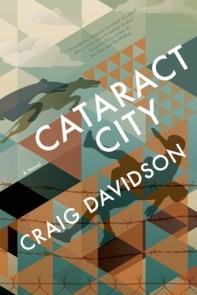“To take the big swings” — An Interview with Craig Davidson, Author of Cataract City
Craig Davidson is a Canadian author of short stories and novels. His first short story collection, Rust and Bone, was published in September 2005 by Penguin Books Canada, and was a finalist for the 2006 Danuta Gleed Literary Award. Stories in Rust and Bone have also been adapted into a play by Australian playwright Caleb Lewis and a Golden Globe-nominated film by French director Jacques Audiard.
Davidson also released a novel in 2007 named The Fighter. During the course of his research of the novel, Davidson went on a 16-week steroid cycle. To promote the release of the novel, Davidson participated in a fully sanctioned boxing match against Toronto poet Michael Knox at Florida Jack’s Boxing Gym; for the novel’s subsequent release in the United States, his publisher organized a similar promotional boxing match against Jonathan Ames. Davidson lost both matches.
His 2013 novel Cataract City was named as a shortlisted nominee for the 2013 Scotiabank Giller Prize. In 2018, his memoir, Precious Cargo, about a year spent driving a bus for disabled children in Calgary, was a finalist for Canada Reads. His 2018 novel The Saturday Night Ghost Club was a shortlisted finalist for the Rogers Writers’ Trust Fiction Prize. In addition to his literary fiction, Davidson has also published several works of horror literature using the pseudonyms Patrick Lestewka and Nick Cutter.

Wrestling has been called the “most popular form of American theater.” Wrestling is storytelling, in many ways, within and across the individual matches. How might wrestling, as a storytelling art, have impacted your own work as a storyteller?
For sure, it’s had an impact. I think wrestling tells stories that are big, messy, and have operatic overtones. They’re melodramatic in a good way. I think a lot of writing is meant to be smaller: the emotions more obscured, the motivations unstated, etc. Which is fine for a lot of writing. But I like my own writing to be big, messy, operatic. To take the big swings, I guess, and sometimes in taking a big swing you’re gonna fail (Gobble-de-Gooker). But if you don’t take those big swings, really going for those big emotional hits, well, you’re never gonna hit one really solidly.
Tell me about your genres and media in this book and other work you’ve done — how you developed your strengths in these genres (and what, if any, connection your strengths in genres may have with wrestling).
Well, although wrestling was a fundamental aspect of my upbringing and I still like to watch media having to do with my personal favorite era of wrestling (the recent doc Mr McMahon being an example, some of the Dark Side of the Ring episodes), I think my own major influences are more from the book and film world. Stephen King, John Carpenter, David Cronenberg, Clive Barker. I used to write about boxing, too, which has a corollary to wrestling, but since my mid-thirties I’ve generally written stuff that doesn’t stray in that direction. The odd fistfight, maybe (I still like writing action), but that’s about it. I view Cataract City as my attempt to explore my love of wrestling, especially as it related to childhood.
Tell us about what came next, after this project, and what will be next for you.
For more information about Craig Davidson, visit https://www.craigdavidson.net/.
